Former leader of the Conservative Party in Wales, Andrew RT Davies, has issued a warning, urging the Tories not to become a light version of Reform UK but to aim to be the authentic option. Davies emphasised that the party must “evolve or die” to remain relevant to the electorate, expressing concerns that Reform UK, led by Nigel Farage, could overtake the Tories’ position in Wales if necessary changes are not implemented. Andrew RT Davies, who led the Welsh Conservatives between 2021 and 2024, stressed the importance of the party reassessing its strategies to meet the demands of the evolving political landscape.

Davies resigned from his leadership position on December 5 and was succeeded by Darren Millar amid internal party struggles. In his resignation letter, he raised doubts about the party’s future direction and called for a significant transformation to maintain its standing in Welsh politics. Writing on Conservative Home at the end of the year, Davies highlighted the need for the Conservative Party to adapt to the changing political environment to avoid being surpassed by emerging political alternatives like Reform UK, which is gaining traction among voters.

The former Conservative group leader emphasised the necessity for the party to recognise and respond effectively to the shifting political paradigms, urging a proactive approach to address pertinent issues that resonate with the public. Davies underscored the importance of safeguarding communities, creating employment opportunities, and fostering secure environments for individuals. He advocated for a strategic shift towards a more community-focused conservative agenda that addresses the needs and aspirations of the people.

Moreover, Davies articulated his belief that the Conservative Party should not adopt a “Reform-lite” stance but should strive to represent the true essence of conservative values. He accentuated the significance of earning the public’s trust by championing community interests, preserving traditions, and upholding cherished values. Davies placed emphasis on the party’s role in safeguarding heritage and confronting societal challenges head-on, regardless of the resistance faced from established political and media entities.
The former party leader’s comments reflect a call for the Conservative Party in Wales to redefine its narrative, engage with pressing issues, and revitalise its approach to resonate with contemporary voter sentiments. Davies urged for a candid dialogue with the electorate, focusing on critical areas like healthcare, education, and economic prosperity, while also addressing broader concerns related to community cohesion and cultural identities. He stressed the imperative of fostering a sense of confidence and connection with the populace to secure the party’s relevance in the evolving political landscape.
In conclusion, Andrew RT Davies’ cautionary advice underscores the evolving nature of Welsh politics and the imperative for political entities to adapt and innovate to remain pertinent. His reflections on the need for the Conservative Party to embrace change, uphold core values, and champion community interests signify a broader call for political reformation to address the contemporary challenges facing the nation. As the political landscape continues to evolve, Davies’ insights serve as a timely reminder of the necessity for political parties to connect with the aspirations and concerns of the public to sustain their relevance and effectiveness in governing.